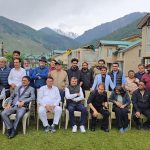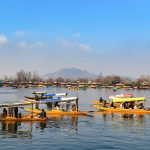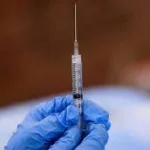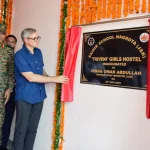Srinagar, May 29: Amid a surge in COVID-19 cases across India, doctors in Jammu and Kashmir have urged the public not to panic but to take precautionary measures, as the Union Territory reported two new COVID-19 cases.
Kashmir’s leading pulmonologist and Head of the Department of Chest Medicine at Chest Diseases Hospital Srinagar, Dr. Naveed Nazir Shah, said cases are being reported from various parts of the country.
“We are receiving many patients with respiratory illnesses, but none have tested positive for COVID-19 so far. The symptoms of COVID-19 and pollen allergies are quite similar,” he said.
Dr. Naveed advised anyone experiencing symptoms to visit the nearest healthcare facility. “There is no need to panic, but people should take necessary precautions,” he added.
“Those who suffer from seasonal pollen allergies should continue their treatment and wear masks regularly as a protective measure.”
The two COVID-19 cases reported in Kashmir involved individuals who had returned from outside the Union Territory and tested positive at GMC Srinagar. According to health officials, both patients are in isolation and do not exhibit serious symptoms.
A senior official from the J&K Health and Medical Education Department said they have consulted experts from premier institutions in the country, who have assured there is no cause for alarm, describing the illness as mild.
“J&K is well-prepared to handle any rise in cases. Isolation facilities are available in several hospitals, and testing is being carried out for respiratory infections and pneumonia cases,” the official added.
Meanwhile, the J&K Integrated Disease Surveillance Programme (IDSP), under the National Centre for Disease Control (NCDC), has intensified surveillance for potential COVID-19 cases and is reinforcing preventive measures.
State Epidemiologist Dr. Harjeet Rai said that testing is ongoing and all guidelines issued by the Ministry of Health and Family Welfare (MoHFW), Government of India, are being strictly followed. “We are fully prepared for any potential rise in cases,” he said.
Dr. Harjeet added that the ministry’s directives align with the national strategy to remain proactive in light of increasing cases in some parts of Asia.
“Routine testing of severe respiratory infections and influenza-like illnesses is being carried out across both Kashmir and Jammu divisions,” he noted.
J&K had reported its last COVID-19 case in November 2024. Since then, regular mock drills have been conducted nationwide as part of the post-COVID preparedness strategy.
Recently, the MoHFW convened a review meeting with experts from the NCDC, Emergency Medical Relief (EMR) Division, Disaster Management Cell, Indian Council of Medical Research (ICMR), and central government hospitals to assess preparedness.
India maintains a robust surveillance system for respiratory viral illnesses, including COVID-19, through the IDSP and ICMR. The Union Health Ministry remains vigilant and continues to monitor the situation closely to ensure appropriate public health measures are in place.








